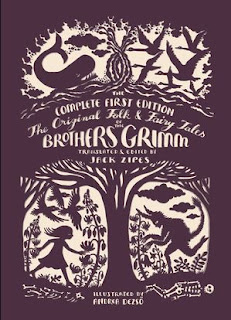Fairy Tales and the Problem of Men
Marina Warner – who is generally awesome and, amongst other things, Professor of English
and Creative Writing at Birkbeck in London - writes, in ‘Once Upon a Time – A Short History of Fairy Story', that:
“All the
favourite and famous fairy tales today are girls stories… But while the stories’
views of femaleness and femininity have been thoroughly shaken up, assumptions
about maleness and masculinity have not been interrogated as enterprisingly –
there’s been a general reluctance to address the question, and a general
retreat from even thinking about boys and fairy tales, probably because doing
so leads into very deep waters about what society expects from young men – and these
are proving hard to plumb.”
She goes on
to remind us that around half of Grimms’ fairy tales star a young hero; and she
suggests that the principal reason for the disappearance of these particular fairy
stories is that they became “irredeemably tainted” by the Nazis, who used the
stories as “a kind of how-to guide to being hard”.
The consequences
of this are simultaneously straightforward and difficult to fathom: young men –
young boys – no longer have access to an exceptionally valuable repository of guidance
on how to prepare for life; but how can we possibly assess the specific consequences of
this?
Warner gives
us a clue:
“While the
fairy tale genre generally ignores patient merit, it does concern itself with
the downtrodden and the ill-used, and a central part of its consolations derives
from fate’s twists and turns. The odds
are stacked against everyone, more or less equally, and everything can change, suddenly,
without rhyme or reason. The
impenetrability of destiny and the helplessness of humans in the grip of chance
count among the sharpest messages of fairy tales, and the exploratory tools, psychoanalytic
or other, blunt themselves on their mystery.”
Perhaps, had
they been better prepared – had they received these sharp messages when young -
there would not be so many furious and dangerous men in the world.
Time to dust
down Grimms’ forgotten tales, perhaps?



Comments